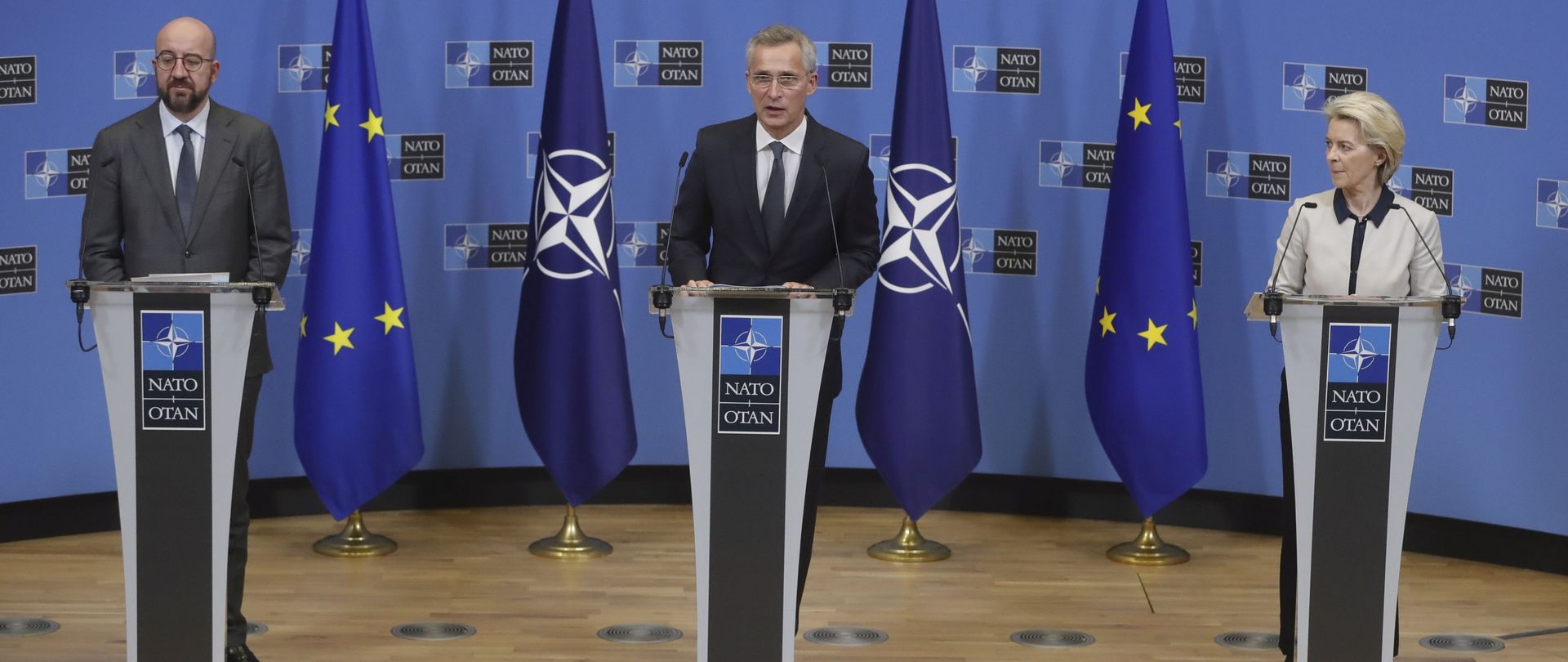
© picture alliance / EPA | STEPHANIE LECOCQ
European Security Order
The unlawful war of aggression against Ukraine is another attempt by Moscow to reshape – to its own advantage – the rules-based European security order established after the end of the Cold War. This has implications far beyond Ukraine’s borders: Many European countries have increased their defence spending, NATO has been significantly strengthening its collective defence in the east, and Finland (2023) and Sweden (2024) have joined the Atlantic Alliance. Following Ukraine’s application for EU membership on 28 February 2022, accession talks were launched in June 2024. On 30 September 2022, Ukraine also submitted an application for “accelerated accession” to NATO. It is true that NATO has since reaffirmed Ukraine’s membership prospects in principle and established the new NATO-Ukraine Council; moreover, all G7 countries and many EU member states have concluded bilateral security agreements with Ukraine. Yet, there is no consensus within the Alliance on a specific time horizon. This leaves open the question of whether the bilateral security commitments are a substitute or a bridge to membership in the Atlantic Alliance and how EU membership can be secured militarily.
Furthermore, Russia’s war against Ukraine has also had implications for the transatlantic relationship and global security: How sustainable is the US commitment to European security, what is the future of nuclear disarmament, and how can global security issues such as autonomous weapons systems, the militarisation of outer space, and AI be regulated?
Contact
-
Dr. phil. Margarete Klein
Eastern Europe, Eurasia (Head of Research Division)
phone:+49 30 88007- 256
Areas of Expertise
- Russian Federation
- Defence and security policy / Armed forces
-

-

Areas of Expertise
- United States
- Nato
- Transatlantic relations
-
Dr. phil. Ronja Kempin
EU/Europe (Senior Fellow)
phone:+49 30 88007- 223
Thematic working group reordering European security (Co-Chair)
Areas of Expertise
- France
- Germany
- Common Security and Defence Policy (CSDP)
- Defence and security policy / Armed forces
- EU foreign policy
- Populism
Publications
-
Charting Ukraine’s EU Path: Engaging with Member States
in: Bertelsmann Stiftung (ed.), Zentrum Liberale Moderne, Gütersloh, January 2026, 52 Pagesdoi:10.11586/2026003
-
Rethinking European Security in Times of Crisis
Policy paper, in: Institute for Global Reconstitution (IGRec), December 2025, 4–12, 9 Pages -
The OSCE as a Yardstick for Multilateral Security
SWP Comment 2025/C 51, 16.12.2025, 8 Pagesdoi:10.18449/2025C51
-
Indispensable: Why Ukraine is becoming a fundamental part of the future European security architecture
Nearly four years after Russia’s invasion of Ukraine, the majority of European states see Ukraine inside and Russia outside the European security order. Susan Stewart, Céline Marangé and Kai-Olaf Lang explain why such an order is emerging and what might prevent it.
SWP Podcast 2025/eP 04, 18.11.2025 -
The Tipping Point: An Emerging Model of European Security with Ukraine and without Russia
SWP Research Paper 2025/RP 05, 06.11.2025, 96 Pagesdoi:10.18449/2025RP05
-
Assessing the Future of the Eastern Partnership: The Fragmentation of a Region and Its Consequences
in: Policy Paper No. 2025-76, ESCP Geopolitics Institute, 2025, 8 Pages